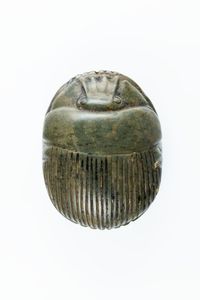
Panel from beneath feet of a cartonnage, with scorpions on soles
An item at Metropolitan Museum of Art
This panel once adorned the exterior foot end of a wrapped mummy. It depicts the soles of two sandals with a scorpion crushed beneath each one. The imagery reflects the ancient Egyptians' desire to control the dangerous elements of their world, a concern that here is transferred to the world of the afterlife. On the mummy, the scene was intended to give power to the deceased over the inimical forces that he would encounter on his nightly journey through the netherworld to-ward rebirth each dawn.
Egyptian Art
An exhibit at Metropolitan Museum of Art
The Met collection of ancient Egyptian art consists of approximately 30,000 objects of artistic, historical, and cultural importance, dating from about 300,000 BCE to the 4th century CE. A signifcant percentage of the collection is derived from the Museum's three decades of archaeological work in Egypt, initiated in 1906 in response to increasing interest in the culture of ancient Egypt.




